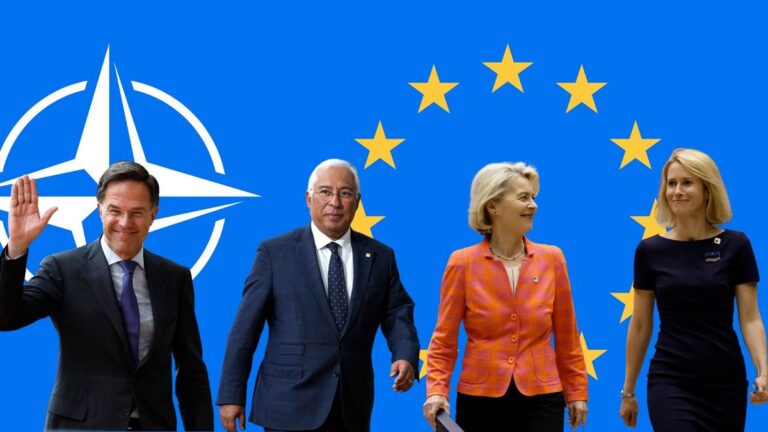In the same week that NATO appointed its new Secretary General, the European Union turns a new page. Here are the key players who will shape the next five years.
European Commission: Ursula von der Leyen
advertisement
Ursula von der Leyen is likely to return to the European Commission presidency after securing the votes in the European Council. All that stands between her and the Berlaymont headquarters in Brussels is confirmation from the European Parliament.
Von der Leyen was first appointed in 2019 and became the first female president of the European Commission. Since then, she has witnessed some of the most significant events that have defined the formation of the European Union over the past five years.
The energy crisis, the growing threat of climate change, Russia’s aggression in Ukraine and other geopolitical challenges marked a mandate that appeared to strengthen her position in Brussels.
The COVID-19 pandemic divided her first committee and her efforts on joint vaccine purchasing became a double-edged sword: initially hailed as Europe’s savior, her actions were overshadowed by a lack of transparency and conflicting messaging around Europe’s vaccine plans.
However, this did not seem to affect her candidacy for a second term, as she quickly became the consensus candidate among the main political forces of the previous term – the European People’s Party, the Social Democrats and the New Europe Party.
Only Italy’s Giorgia Meloni and Hungary’s Viktor Orban, who abstained from voting, expressed dissatisfaction with the process by which other EU leaders agreed the deal.
A German national, von der Leyen was born in the Brussels suburb of Ixelles and began her political career in local politics as a member of the Lower Saxony state parliament. She is married to Heiko von der Leyen and the couple have seven children.
European Council: Antonio Costa
Portuguese socialist António Costa will become the new president of the European Council, succeeding Charles Michel on December 1 after being elected by other lawmakers.
After his appointment, Costa promised that his role would be focused on continuity and “on keeping on track the strategic agenda approved today by EUCO, which will guide the European Union for the next five years.”
Costa served as Portugal’s prime minister from 2015 to 2024, but resigned after initially being investigated for corrupt investment deals in lithium and green hydrogen projects. His current status as a witness did not prevent him from becoming prime minister.
Since the investigation was first made public, Costa has consistently maintained his innocence and said he resigned from the government to preserve political integrity.
During his time in power, he allowed non-EU citizens to move to Portugal without a work contract, creating the impression of one of the most open immigration policies in the EU, drawing opposition from far-right leaders.
Costa is well-liked by European Commission President Ursula von der Leyen and has been a constructive partner in the European Council for almost a decade.
Political analyst Ricardo Borges de Castro told Euronews’ Isabel Silva that Costa is a skilled negotiator who is able to “bring together” the positions of leaders from all political walks of life and get to places that others would likely have difficulty reaching.
Costa has been married to Fernanda Maria Goncalves Tadeu since 1987 and has two children. He will be the first person of colour to hold the top EU job.
Italian Prime Minister Georgia Meloni voted against his appointment on the board.
High Representative: Kaya Kallas
Estonian Prime Minister Kaja Kallas has been elected by the European Council as the next High Representative for Foreign Affairs and Security Policy, succeeding Josep Borrell.
Kallas has the support of his colleagues on the Council but his appointment still needs approval from the European Parliament, which is due to vote in September and will need the backing of a majority in the European Parliament’s foreign affairs committee.
advertisement
If appointed, she would be the first Eastern European to hold the role and the first Estonian to hold the EU’s top job.
During his time as Estonia’s prime minister, Kallas was one of the EU’s strongest voices in condemning Russia’s invasion of Ukraine, calling for sanctions and sending military aid.
Her appointment comes after her liberal group, Renew Europe, fell to the fourth-largest party in the European Parliament following disappointing results in June’s European elections.
She is married to Arvo Halik and has three children, two sons and one daughter. Her father, Siim Kallas, was also a politician, serving as Prime Minister of Estonia from 2002 to 2003 and later as European Commissioner from 2004 to 2014.
At the Council meeting, it faced a dissenting vote from Italy’s Georgia Meloni and an abstention from Hungary’s Viktor Orbán.
advertisement
NATO: Mark Rutte
Ambassadors from NATO’s 32 member states on Wednesday formally nominated outgoing Dutch Prime Minister Mark Rutte to be NATO’s next secretary-general.
He will take up his post on October 1 and serve a minimum four-year term, succeeding former Norwegian Prime Minister Jens Stoltenberg after a 10-year term.
Rutte has been the Netherlands’ longest-serving prime minister since taking office in 2010. He resigned in July last year after the four-party coalition government collapsed over immigration restrictions.
During his time as Dutch Prime Minister, he lived in the same part of The Hague that he grew up in. He cycled to work every day and is known to be a creature of habit.
Hungarian Prime Minister Orban won his appointment over objections including the use of Hungarian funds to aid Ukraine.
advertisement
Budapest lifted its veto over the agreement after Rutte wrote to his Hungarian counterpart Orban assuring him that, as NATO secretary-general, he would not use Hungarian troops or Hungarian funds to support Ukraine.
European Commission President Ursula von der Leyen congratulated Rutte on being elected as NATO’s new secretary-general, saying “your leadership and experience will be crucial for the Alliance at these challenging times.”

